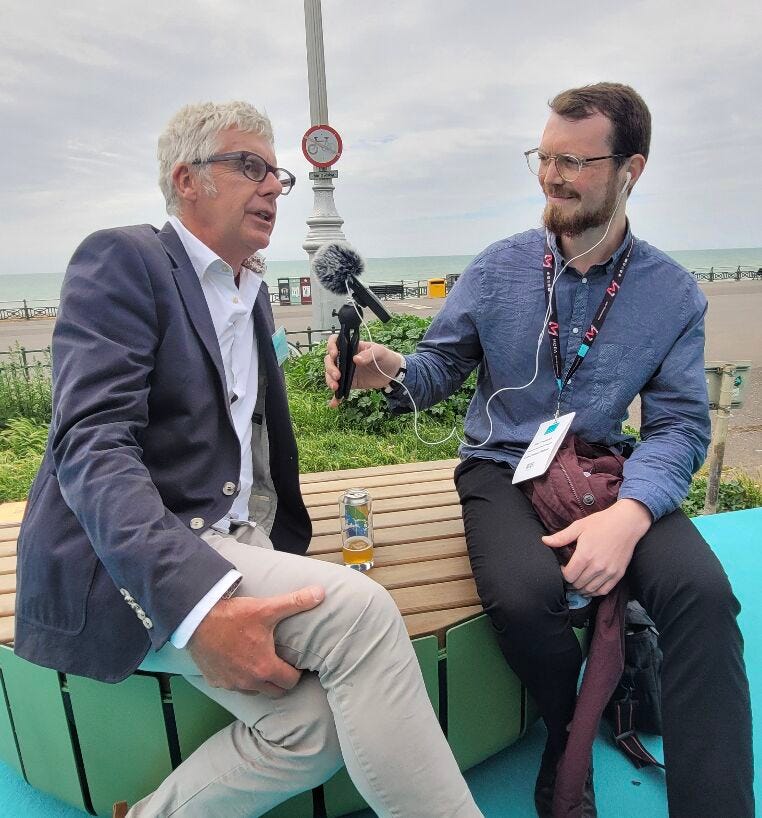Communicating the Climate Crisis
How to talk about climate change so people will listen (and act)?
Climate change is complicated and scary. It’s impossible to ignore and yet uncomfortable for people to engage in. So, how can we communicate the climate crisis in a way that inspires positive action?
Below are a few humble suggestions from my experience podcasting, speaking and running events over the last few years.
Find the opportunity in crisis
I often use the cartoon above in presentations I give about climate change. This is the aspect of climate action so many people miss. It’s not about sacrifice, it’s about creating a better life for everyone. The actions we must take on climate change - like switching to renewable energy, regenerating nature, walking and cycling, and insulating homes - are all things we would want to do anyway. Climate change is forcing us to transform society and cities for the better, so let’s not miss that opportunity. Communicating the opportunities for better health, more biodiversity, stronger communities and lower bills can inspire people towards climate action.
Bring it down to earth but don’t forget the big picture
Climate change can seem big, abstract and distant. Bringing it down to earth with tangible examples can help your audience to see what action looks like. I had the pleasure of interviewing Rangers Divya, Luke and Charles for episodes of The Green Urbanist podcast about the work they are doing in their local areas. From planting community orchards to creating a parklet and a local nature reserve, their projects are local, grassroots initiatives. These projects are inspiring in themselves but what struck me is how the Rangers kept an eye on the big picture. For these Rangers, connecting city residents to nature is a way of building stronger communities, inspiring sustainable behaviour and accelerating climate action. To me, that makes their stories all the more compelling.
Let your audience explore solutions and learn by doing
In October 2022, I co-facilitated student workshops at the School’s Climate Assembly in Sheffield. Instead of spending our time lecturing these teenagers about what climate action is needed, we decided to let them figure it out themselves. Using the En-Roads Climate Simulator (an excellent, free tool for testing climate actions), we got the students working in groups to figure out what actions they thought would be most impactful in reducing global temperature rise. We then tested their suggestions in En-Roads and discussed the results. Seeing in real-time the impact of reducing deforestation, investing in renewables or electrifying transport (among many others) allowed the students to develop a deep understanding of why certain actions are more impactful than others. Instead of being presented with lots of dense information, they generated their own knowledge through experience. Facilitating your audience to learn by doing can be much more impactful than simply presenting them with facts. It also showed them that keeping global temperature rise below 2 degrees Celsius is possible but there’s no silver bullet - we need changes across society.
If you’re interested in En-Roads, I provide an introduction to the tool in this post:
Open up to diverse perspectives
We all may feel like we know what needs to happen to stop climate change. But how do we know we’re right? Other people, just as passionate and knowledgeable as us, may have totally different ideas. Creating space for these diverse perspectives can be uncomfortable but it is essential to figure out a path to a sustainable and fair future. The London National Park City podcast, The Regrowth Project, does this beautifully. The whole concept is to bring together interesting and diverse people for a conversation around an important topic. I got the chance to host an episode about ‘rebirth’ and the conversation covered a huge range of topics including power structures, indigenous knowledge, ancient religions, microbiology and, of course, sustainability. Creating space for such diversity is always enriching and reminds us that no one person has all the answers.
One of my favourite episodes of the Green Urbanist Podcast explores a topic that does not get much attention in mainstream media: the influence of colonialism on the sustainability movement. This is a difficult topic for some people but I invite you to stay open and really listen to what’s being said.
Thanks for reading. Now it’s your turn. Let me know in the comments your thoughts on effectively communicating climate change.








These are all excellent ideas, but isn't it verging on impossible to convince a denier, for want of a better word? I'm thinking of covid refusers, ant- vaxxers, Brexiteers, they are all so adamant and vociferous in their views, it can be hard to even be heard at times. Same for people who dont believe in climate change. I know that doesn't mean we should give up, but how to stay motivated and positive?